News & Notices
Member Spotlight: Jeromy Hopgood
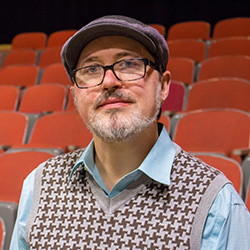
Jeromy Hopgood
Jeromy Hopgood, Scene, Projection, Lighting, and Sound Designer; Associate Professor of Entertainment Design & Technology at Eastern Michigan University; resident designer for the Michigan Shakespeare Company; author of QLab 3 Show Control and Dance Production: Design & Technology (Focal Press/Routledge), and blogger at Entertainment Design & Technology.
USITT: What is your earliest theatre memory?
Jeromy: My earliest theatre memories all revolve around acting. I have always been a bit of a ham, and spent time as a kid performing in shows and playing music. As I got older, I turned my attention toward writing and visual art. By the time I made it to undergrad, I had pretty much left the idea of theatre behind and was focusing on a BFA in creative writing with most of my extra-curricular activities involving music (as a percussionist in band). It wasn't until three or four years in that I discovered the possibility of design and technical theatre and changed my major over to theatre.
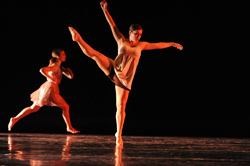
Dance lighting. Eastern Michigan University Dance. 2011.
What led you to technical theatre?
As a kid, I was always drawing or painting. My parents both worked in house painting and roofing, so I spent a lot of my time around power tools and learned how to design and build things. My summer work was always helping out my dad on jobs. As a result, once I started thinking about what to do career-wise, I shied away from anything related to power tools or construction. Ironically, it wasn't until working on a few projects as an undergraduate that I realized technical theatre was an option that combined many of the skills I had into an artistic outlet I never realized was possible.
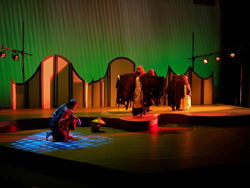
The Good Woman of Setzuan. Appalachian State University. 2007.
You are a scenic, lighting, projection, and sound designer – do you have a favorite discipline?
If I had to choose, scenery and projections are definitely my favorite areas. Scenery appeals to my traditional artistic side, working with watercolors to create painter's elevations and creating scale models. Projections have always interested me, from the point when I was doing the work with slides on a carousel. I feel so lucky to be working in this time and place, with the technology existing to let projection and media truly aid in the storytelling process. I spend a lot of my research time working with projection software and experimenting with different applications for live performance. What a great job to get to play with new gadgets for a living!
You wrote books on QLab Show Control and Dance Production – how did that happen?
Both my books came about from my own personal interests and conversations with students and other teachers about a hole in the market. I had been teaching QLab in my classes since version 1. By chance, when I contacted Chris Ashworth at Figure 53 about my idea, they were in the early stages of beta testing QLab 3. They added me as a beta tester, which gave me access to the software while it was being developed. This was invaluable to the project and meant that the book was on the market within just a few months of the software being released.
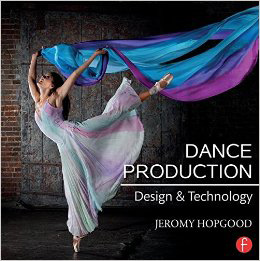 For my Dance Production book, I was surprised to discover that even though most dance programs require their dancers to take a dance production course, there was no book on the market that actually focused on design and technology for dance. From my perspective, someone needed to put together a book that talked about the ways in which theatre people and dance people collaborate to produce dance productions.
For my Dance Production book, I was surprised to discover that even though most dance programs require their dancers to take a dance production course, there was no book on the market that actually focused on design and technology for dance. From my perspective, someone needed to put together a book that talked about the ways in which theatre people and dance people collaborate to produce dance productions.
How did you get involved in USITT?
I first learned about USITT as an undergraduate student, but I never really had access to the funds to attend a conference until I started teaching. That's why I'm so invested in finding ways to help my students get to USITT these days. My first conference was Toronto back in 2005. I was lucky to have a number of colleagues who got me involved with the Education Commission and Scenic Design Commission early on.
As an educator, what advice do you give students interested in technical theatre?
I primarily work with undergraduate students, so for most of my students the biggest question is what to do after graduation - freelance work, graduate school, work for a production company? I feel like it is important for those of us who regularly work in the industry to pass on pragmatic tips and let students see your passion for the field. As a young designer, I felt like no one ever explained to me the nuts and bolts of working in this industry - how contracts work, paying your taxes, networking, etc. These are the kinds of things I try to weave into my lectures when possible, but so much of it is passed on through mentoring.
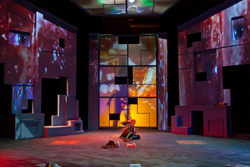
Doctor Faustus. Eastern Michigan University. 2013.
Can you tell us about the role of mentoring in your career?
Mentoring has always been one of my favorite aspects of working in theatre. I have benefited from some wonderful mentors along the way and seen firsthand how a little helping hand from a mentor can truly change your life. In undergraduate, I was lucky enough to have a mentor who saw potential in me and didn’t let me give up. This was at a time in my life where things could have easily gone south for me, but she showed me a different possibility for my future that I hadn’t envisioned. She encouraged me to apply to graduate school at the University of Arkansas, which truly opened so many doors for me and set me on the path to be where I am today.
During graduate school, I worked as an Assistant Scenic Designer at the Williamstown Theatre Festival and got to experience the impact of working with professional mentors. Williamstown is one of those great summer theatre training programs that brings together professionals at the top of their game with young designers just starting their careers. I had the opportunity to work with folks like David Gallo, Allen Moyer, Ralph Funicello, and Neil Patel, and really experience the professional side of design in a way that you just can’t replicate in the classroom.
These days, I try to employ my students on freelance gigs outside the university as assistants or in production positions so they can see how the process really works. I think this kind of experience is so valuable to their education!
Suggest a USITT Member for the Spotlight!
If you know of USITT members whose work should be in the Spotlight, please feel free to suggest them. Contact Janet Gramza at janet@usitt.org.

